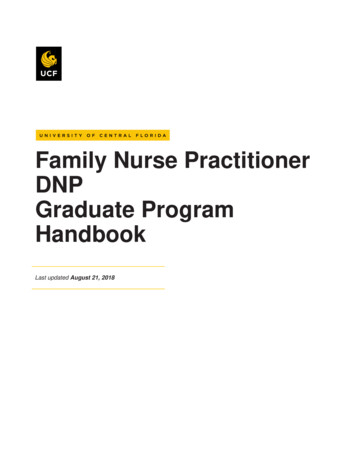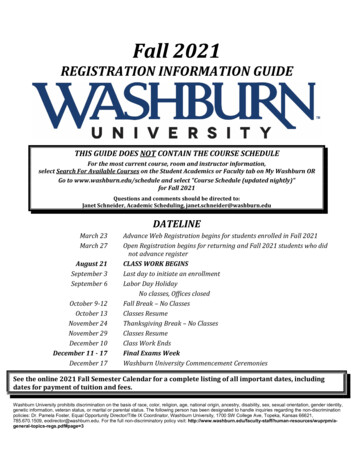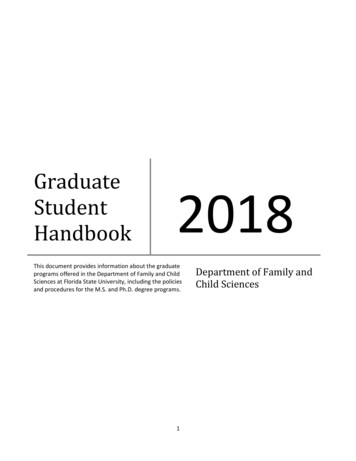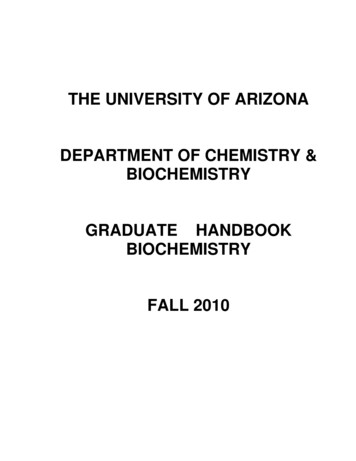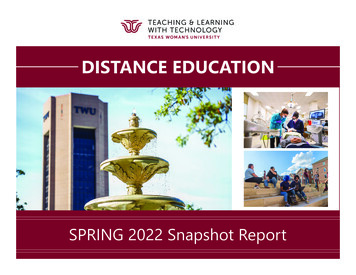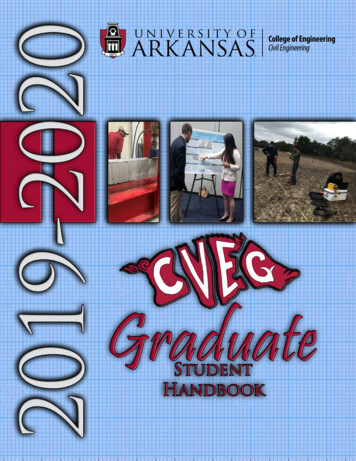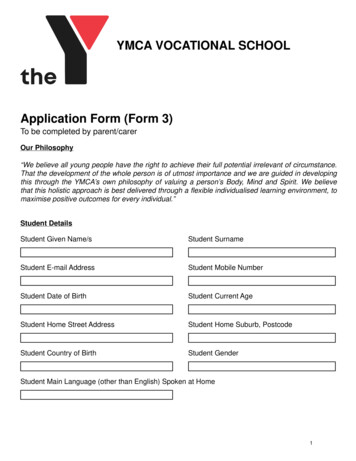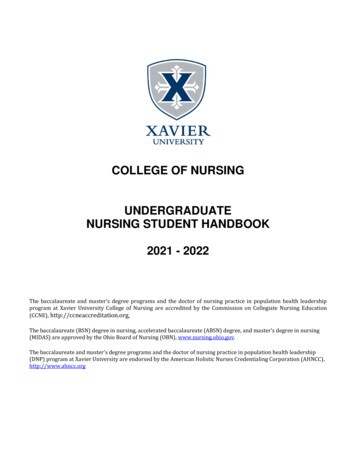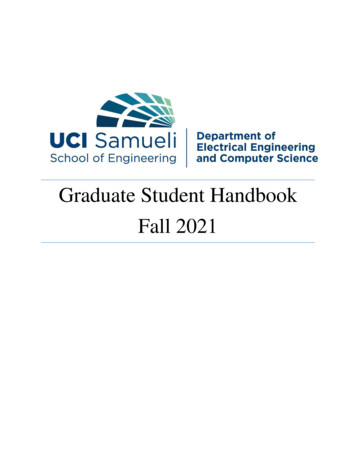
Transcription
Graduate Student HandbookFall 2021
Table of ContentsDepartment Office . 2Department Graduate Advisors and Department Staff. 2EECS Department Staff. 3Henry Samueli School of Engineering (HSSoE) Graduate Student Affairs Office (GSAO) . 3Parking . 4Housing . 4Desk Space. 4Teaching Assistant Office Hour Space . 4Keys . 4Mail . 4Copy Machines . 4Library . 4Funding . 4Helpful Links . 5California Residency . 5Student Health Insurance Plan . 5Room Reservations . 6Academic Matters. 6Deadlines and Requirements . 6Ph.D. Research Advisor . 6Addressing Concerns. 7EECS Graduate Advisor. 7Good Academic Standing . 7Academic Honesty . 7Milestones toward M.S. Degree Completion . 7Department Seminar . 7M.S. Degree Requirements . 8Milestones toward Ph.D. Degree Completion. 9Ph.D. Degree Requirements . 9Dissertation . 10Appendix I . 11Appendix II . 12
PrefaceThis handbook is intended as a guide for beginning graduate students in Electrical Engineering andComputer Science (EECS). It provides information on questions that will be important for a new arrival,outlines department procedures and policies, and gives requirements for the M.S. and Ph.D. degrees. Itis neither an exhaustive compilation nor an official statement of requirements. The UCI GeneralCatalogue and the Henry Samueli School of Engineering Graduate Student handbook should also beconsulted. This handbook is updated annually and is published on the EECS website.Department OfficeThe EECS Department Office is located in Engineering Hall 2200. The main function of the EECSDepartment Office is to support the department’s academic mission. Faculty and staff are available toprovide assistance and to help students achieve their educational goals. They work to ensure compliancewith all university, Henry Samueli School of Engineering, and International Center rules and guidelinesand collaborate with various departments on many student-related issues. The EECS Department is yourfirst point of contact for any questions or concerns you may have. The Graduate Division serves as thefinal school-wide approval for petitions, advancements to candidacy, degree conferrals, and other processes.Department Graduate Advisors and Department StaffThe Department Graduate Advisor is a faculty member who serves as the official representative of theGraduate Dean in matters affecting graduate students. Graduate Advisors work closely with, the HSSoEGraduate Student Affairs Office (GSAO) and UCI Graduate Division. The Graduate Dean depends onthe experience and judgment of Graduate Advisors, and on their recommendations in matters requiringthe Graduate Dean's action. The Graduate Division staff, the Graduate Student Affairs staff, and thedepartment coordinator(s) provide information to the Advisors on a continuing basis and respond torequests for special assistance.The EECS Department Graduate Advisors are responsible for supervising graduate study in theirdepartment and for helping graduate students make connections with individual faculty advisors andmentors.Payam Heydari, Graduate Advisorpayam@uci.edu(949) 824-9324Syed Jafar, M.S. Program Graduate Advisorsyed@uci.edu(949) 824-16842
EECS Department StaffJulie Strope, Department AdministratorEmail: jstrope@uci.eduPhone: (949) 824- 6627Amy Pham, Graduate Program CoordinatorEmail: amy.pham@uci.eduPhone: (949) 824- 5489Karen Van, Assistant to the Chair and MSOEmail: ktvan@uci.eduPhone: (949) 824- 4151Beril Seymen, Graduate Program CoordinatorEmail: bseymen@uci.eduPhone: (949) 824- 6012Elvia Salas, AP Coordinator/Special ProjectEmail: salase@uci.eduPhone: (949) 824- 4821Pauline Eatherly, Undergraduate Program CoordinatorEmail: peatherl@uci.eduPhone: (949) 824- 2645Luba Konkova, AP and PayrollCoordinator Email: lkonkova@uci.eduPhone: (949) 824- 9780Bao Nguyen, Lab TechnicianEmail: baonn@uci.eduPhone: (949) 824-4151Henry Samueli School of Engineering (HSSoE) Graduate and Professional Studies (GPS)From recruitment and admission to degree conferral and graduation, HSSoE Graduate Student AffairsOffice (GSAO) provides many services for new and continuing graduate students. As you navigatetowards degree completion, the main function of the GSAO is to provide academic counseling andadvice for you. GSAO collaborates with various other departments on many student-related issues andworks closely with the EECS Department to ensure your progress.Fadi Kurdahi, Associate Dean for Graduate and Professional Studieskurdahi@uci.edu (949) 824-6475Jean Bennett, Directorjean.bennett@uci.edu (949) 824-6475Mark Banderas, Graduate Counselormark.banderas@uci.edu (949) 824-3562UCI Graduate Division http://www.grad.uci.edu/ 120 Aldrich Hall (949) 824-4611UCI Graduate Division oversees all post-baccalaureate advanced degree programs at UCI and allgraduate students. The Dean of Graduate Division is responsible for the administration of graduate andpost-doctoral study at UCI in accordance with academic policies established by the Academic Senatevia Graduate Council. Graduate Division serves as the campus-wide advocate for the advancement ofgraduate education and strives for standards of excellence, fairness, and equity in all graduate programsat UCI.International Center php G302 UCI Student CenterThe International Center advances and facilitates international engagement at UCI to enhance theacademic and personal experience of the international community. The International Center staff iscommitted to serving campus constituents through advising, immigration services, programming,advocacy, and outreach.3
Getting StartedParkingAll vehicles must display a valid UCI parking permit when parked on campus or used metered spaces.The Parking and Transportation Services Office is located in the Public Services Building. TheSustainable Transportation Program provides those who do not drive regularly a limited amount for freepermits each year. Information can be found at: http://www.parking.uci.edu/AT/HousingUCI has guaranteed graduate housing for incoming students. For more information, or to apply, pleasesee http://www.housing.uci.edu/Desk SpaceEECS highly prioritizes providing individual work space for Ph.D. students. Students are assigned spacebased on availability and the Professor’s request. Please contact the EECS Lab Technician for furtherdetails. Every effort is made to make graduate student desk spaces habitable and quiet.Teaching Assistant Office Hour SpaceThe tables and chairs in Engineering Hall 2202 may be used for TA office hours.KeysEECS graduate students are supplied with the necessary keys to offices and a card key for after-hoursentrance into the building once required safety training is completed. There is a 25 refundable depositfor each key. Please contact the EECS Lab Technician for procedures to request keys.MailStudent mail boxes are located in Engineering Hall 2202.Copy MachinesA copy machine is located in Engineering Hall 2200. Copy services are for business purposes only.Teaching Assistants will be given a code to access the copier. Please see an EECS Department staffmember for your TA access code.LibraryJulia Gelfand is the Research Librarian responsible for EECS holdings, and can help with a variety oflibrary needs. Student ID cards may be activated at the library for check-out privileges. ANTPAC, apublic access catalog, provides information on UCI library materials. Libraries at Scripps Institution ofOceanography (UCSD) and UCLA are also accessible.FundingNot all students receive financial support. Funding at the M.S. level is very limited. Funding at the Ph.D.level is more common, but is not guaranteed and should not be expected if not offered at the time ofadmission. There are three mechanisms for funding: department fellowships, research assistantships,and teaching assistantships.Some students are initially funded by department fellowship. Taxes are not deducted from fellowships,although they are considered taxable for reporting purposes.4
Research Assistants (GSR or Graduate Student Researchers) are paid by faculty member's research grants andare considered regular UCI employees; this is the typical funding mechanism while you work on your dissertationresearch. Students are also required to gain teaching experience by serving as teaching assistants (TA). GSR andTA funding is considered payroll. Taxes are withheld from payroll according to how you fill out youremployment paperwork. Please consult a tax professional if you have questions regarding tax withholding orliability.University payroll is payable on the first of each month following the month worked. Fellowshippayments are typically paid in advance. Unfortunately, we cannot completely control the dates paymentsare made, especially fellowship payments. We encourage you to ask any questions about funding thatyou may have.Due to the two payment systems (university payroll and the fellowship system) you may need to signup for direct deposit for both systems. Please see the links below.Fellowship system: https://zotaccount.uci.edu/University payroll: htmlHelpful LinksFellowship opportunities: r opportunities: hing-assistants-and-readersEECS career opportunities: unitiesPayroll information (including employment verification and paystubs): https://eec.hr.uci.edu/ZotPortal : r.uPTax information: https://accounting.uci.edu/tax/index.htmlGlacier: htmlStudent Funding: ex.phpAccounts and access(including email, internet, Duo MulitFactor rnia ResidencyGraduate students who are U.S. citizens are expected to establish California residency so they will notbe liable for non-resident tuition in succeeding years. Foreign students are generally not eligible toestablish residency. Obtain a Petition for Resident Classification from the office of the Registrar and fileit shortly after you arrive. The following items are useful in demonstrating residence: employmentverification showing date employment started, California Driver's License, California automobileregistration, California voter card, California income tax return, bank statements, utility bills, and rentreceipts, especially for summer months. Please be sure to update your permanent address to your homeaddress right away. For further information and the petition to file for residency, please lass grad.pdfStudent Health Insurance PlanThe University of California requires all students to have major medical health insurance as a nonacademic condition of enrollment. The department is charged quarterly for the Student Health InsurancePlan (SHIP). If you are covered under another policy please submit an online request to waive out ofSHIP. The waiver can be found here:http://www.shs.uci.edu/health insurance privacy/insurance.aspx5
Room ReservationsThe Department Conference room and meeting rooms are in Engineering Hall are for faculty and staffmeetings, seminars, and for use as reading areas. No food, clutter, or use for extended periods ispermitted. Conference rooms may be scheduled as needed. Please contact EECS staff for availabilityand to submit a room reservation request. If you have any questions about your reservation please contactus at eecsinfo@uci.eduAcademic MattersDeadlines and RequirementsEach graduate student is responsible for meeting all necessary deadlines and requirements. The bestsources of information are the UCI General Catalogue (http://catalogue.uci.edu/), Graduate Division,(http://www.grad.uci.edu/), the Registrar (http://www.reg.uci.edu/) and the School of Engineering anddepartment ines).Ph.D. Research AdvisorEach entering graduate student will be assigned a faculty advisor. The faculty advisor is assigned basedon the student’s interests and communications with faculty during the application processes When theadmission offer involves funding from a faculty member it is typically the case that the provisionaladvisor becomes the principal advisor, i.e., the Ph.D. research advisor. Until the principal advisor isidentified we encourage you to explore new opportunities, colleagues, and areas of research. First-yeargraduate students must match with a Ph.D. research advisor no later than 12 months after the beginningof the student’s first quarter in the Ph.D. program. Graduate students should consult with their principaladvisor for any matters relating to their course of study or research goals.When looking for an advisor, visit the faculty page on the EECS y-staff/faculty and navigate through the EECS departmentlisting of faculty. Look for the faculty profiles and review them. Look for key words and researchactivities that may be aligned with your research interests. Continuing students who are switchingadvisors (for whatever reason) must match with a new faculty research advisor no later than by the endof the subsequent quarter.Identify some faculty that may be of interest to you, contact them via email. You might need to actuallyfind them in their labs and/or office and personally ask if they would entertain the possibility of youworking with them. You may want to have your curriculum vitae (resume) available, detailing yourresearch and work experience, presentations, publications, and poster sessions. This will help the facultymember determine if your experience would be beneficial to his or her lab. Ask professors in class ifthey could be your research advisor or if they know of anyone in the department who would be a goodfit for you. Consult the EECS Graduate Advisor for advice on selecting a research advisor.It is important that you talk freely to your Ph.D. advisor about your financial needs to support your PhDresearch activity. If you need continuous and stable financial support you should select an advisor thatis able to provide the funding. The funding provided to you by an advisor in the form of a GSRappointment is to perform research activity and the adviser may need to collect your research results toshow them to the sponsoring agency or company. Satisfactory research effort is required for continuedGSR funding. Working as GSR is a win-win situation for the student who is progressing toward the PhDwith financial support and for the advisor’s research agenda. It is recommended that you meet with theGraduate Advisor if you have questions.6
EECS Graduate AdvisorThe duties of the Graduate Advisor are to supervise the activities of student advisory committees, reviewgraduate study plans, and monitor the progress of all graduate students. The Graduate Advisor is alsoresponsible for coordinating student awards, assigning teaching assistantships, overseeing curriculumrevisions, and organizing the comprehensive examination. Students should feel free to speak with theGraduate Advisor at any time about any issue, especially those relevant to their academic and researchprogress and financial support.Addressing ConcernsStudents are welcome and encouraged to bring concerns or issues to the attention of the EECS GraduateCoordinator who can guide them on the proper course of action. Normally, a graduate student's principaladvisor or thesis committee will attempt to solve problems. Problems involving department policiesshould be addressed to the Graduate Advisor or Department Chair. In the case of more serious problems,the GSAO and Associate Dean of the School of Engineering and other university officials may becomeinvolved, but only after attempts at solving the problem within the Department are exhausted.Good Academic StandingStudents are expected to maintain “Good Academic Standing” as defined Appendix I. Students notmaking good academic progress will be provided a letter that outlines the reasons for unsatisfactoryprogress. An opportunity to correct deficiencies and a specified deadline time will be given.Academic HonestyThe importance of academic integrity cannot be overstated. It is never acceptable to present someoneelse’s work or research as your own. Students are expected to, at all times, adhere to The UCI AcademicSenate Policies on Academic Honesty which are included in this packet as Appendix II. Students thatviolate UCI’s academic honesty policy will be dealt with on a case-by-case basis. Consequences mayinclude dismissal from UC Irvine.Milestones toward M.S. Degree Completion Meet and discuss program and plan schedule with Graduate Advisor/Graduate Student AffairsCounselor/Graduate Coordinator Begin Coursework Fill out departmental Plan of Study Form (by the end of first quarter) Comprehensive Exam students: Complete all coursework and seminars Thesis students: Select a committee chair, select committee members, register for M.S. thesisresearch units Turn in M.S. Advancement to Candidacy Form (at least one quarter before you plan tograduate) Comprehensive Exam students: Complete final examination/paper/project/other assignment(if applicable) Thesis students: Complete and defend thesis, and submit Thesis Signature Page Form M.S. degree conferred7
Department SeminarM.S. students completing the comprehensive course of study must take 1 unit of EECS 294, Ph.D.students must take 4 quarters of EECS 294 to meet degree requirements. Seminars are generally heldon the first and third Friday of every month. In order to receive credit, students are required to sign theattendance sheet and be present for the duration of 4 out of the 5 seminar, and take and pass 3 quizzes onthe material presented.M.S. Degree RequirementsThe PLAN OF STUDY FormThis form identifies the courses that you are required to take to satisfy the requirements of your degree.You can obtain this form at: map ms. Completion ofthis form is required for ALL M.S. students during the second quarter. You should submit yourcompleted form to the Graduate Coordinator for approval by the EECS Graduate Advisor. You canmodify/re-file the form later if your course interests change.Advancement to Candidacy for M.S. Form1. Students must file the Advancement to Candidacy/Final Degree Report - Master’s Degree CompExam form one quarter before graduation quarter (form should be submitted to the EECSdepartment). You can obtain the form at http://www.grad.uci.edu/forms/2. Complete the course requirements (see below under Option 1 and Option 2).3. Discuss with your Graduate Coordinator early on whether the comprehensive exam or thethesis option best suits your interests. Students in the M.S./Ph.D. track may select eitherapproach.Option 1: M.S. Degree with Thesis (original research with an advisor and a written M.S. thesis) Must complete a M.S. thesis approved by a committee of 3 faculty members. Must complete 7 core courses and/or concentration courses, and five elective courses Elective courses can be:o No more than 4 courses EECS 296 (16 units)o No more than 1 course of EECS 299 (4 units)o No more 1 upper division undergraduate elective course(with approval of EECS graduate advisor)In summary: 12 courses required. CPE 3 core/4 concentration/5 elective. EE 7 concentration/5elective. No seminar course required. A letter of a “B” or higher is required in each course and anoriginal thesis is needed to complete a M.S. Thesis degree option.Option 2: M.S. Degree with Comprehensive Exam Must complete the core courses, concentration course and elective courses per majorrequirement. Courses are (4 units minimum/course) numbered 200-289. Electives course maybe taken from other departments if approved by the EECS graduate advisor. Must complete all courses with a “B” letter grade or higher Must complete 1 course of EECS 294-Seminar Only one (4-unit) course of EECS 299 Individual Research will count as an elective towardsM.S. degree requirements.8
In some instances, up to two upper-division (numbered 100-199) undergraduate courses may count asan elective course toward degree requirements (with approval of EECS Graduate Advisor). Insummary: 12 courses and seminar are required. CPE 3 core/5 concentration/4 elective, 1 EECS294. EE 4 core/5 concentration/3 elective/1 EECS 294. No comprehensive exam. A letter of a “B”or higher is required in each course to count towards a M.S. Comprehensive Exam degree optionMilestones toward Ph.D. Degree Completion(If earning M.S. along the way, follow path to M.S. degree above) Match with a research advisor within the time-frame mentioned on page 10Take Preliminary Exam (check departmental policy on deadline to complete)Continue Ph.D. researchPrepare proposal to be reviewed for Qualifying ExaminationSelect committee members and submit Nomination Form for Qualifying CommitteeTake Qualifying Examination, select your doctorate committee, and submit Ph.D. Form ITake and complete 4 quarters of EECS 294Continue Ph.D. researchPresent final dissertation defense, fill out Ph.D. Form II, and submit necessary dissertation materialsPh.D. Degree conferredPh.D. Degree Requirements Coursework:o EECS 294 – Seminar (4 quarters)o EECS 299 – Individual Research (12-16 units per quarter, each fall, winter and spring)o EECS 297- Dissertation Research (12-16 units per quarter, each fall, winter and springafter passing qualifying exam) Ph.D. Preliminary Exam (see below). “Match” with faculty advisor(s) to guide your doctoral research. The Ph.D. Qualifying Exam (Advancement to Candidacy exam)o This should be completed by the end of year 3 (see below). Written dissertation with oral defense (see below).Preliminary ExamPh.D. students are required to take the “prelim” exam each quarter that it is offered until they haveeither passed the exam or exhausted their two attempts. M.S./Ph.D. students must pass the Ph.D.preliminary exam within two complete academic year cycles after entering the M.S./Ph.D. program.Students register to take the exam by completing a form obtained from the Graduate Coordinator. ThePreliminary Exam consists of a written and an oral exam. Students that do not pass the preliminaryexam within the stated period, either due to no attempt or a failed attempt, will not be in “goodacademic standing” and will be subject to disqualification.9
Matching with a Ph.D. AdvisorIn order for Ph.D. students to remain in good academic standing, they must match with a Ph.D. Advisorfor research. Newly admitted students must be matched with a faculty research advisor no later than 12months from the beginning of the student's first quarter of Ph.D. study.Example: A student enters Ph.D. study at UCI in the fall 2020 quarter. They must match with a facultyresearch advisor by the end of the summer 2021 quarter.Policy for Continuing Ph.D. StudentsContinuing students who change advisors (for whatever reason) must match with a new faculty research advisorno later than by the end of the subsequent quarter (excluding summer term). During the period that the student issearching for a new advisor, the advisor of record will be the Graduate Advisor in the student’s homedepartment/program.Qualifying ExamThe Qualifying Exam covers dissertation ideas and results of preliminary research. The committee must becomprised of 4 EECS faculty (with at least 2 holding primary appointments in EECS) and 1 faculty member notaffiliated with EECS (outside member). Your research advisor will be on your exam committee. The QualifyingExam is taken after passing the Preliminary Exam, no earlier than the end of the 1st year, and no later than the endof the 3rd year in the M.S./Ph.D. program. A written research proposal (dossier) of approximately 30-40 pages inlength must be submitted to the committee members at least one week prior to the exam. The exam will takeapproximately 90 minutes – your research presentation should be 40-50 minutes and reviewed by your advisorbefore your exam. A Nomination form needs to be approved 2 weeks before the exam date and can be found m-nomination-form-fillable.pdfOral DefenseAn oral presentation at the completion of your Ph.D. dissertation is required. The presentation should be 45minutes and should summarize your major research findings. The student’s committee members for the Ph.D.dissertation (3 including advisor) need to be present. The entire department is invited and visitors are welcome.The student should be prepared to answer questions from the committee. The committee may request a closedsession for their questions. It is best if the student’s written dissertation has been approved by the committee inadvance of oral defense.Dissertation Copies of past dissertations are available in the UCI library. Format guidelines are available at http://etd.lib.uci.edu/format UCI theses and Dissertations: http://etd.lib.uci.edu/ Have your advisor approve the dissertation first, then the two other committee members.10
Appendix I: EECS “Good Academic Standing” criteriaSatisfactory progress is determined on the basis of both the student's recent academic record and overallperformance. Criteria for determining satisfactory progress toward degree is outlined below. Student recordsshould be reviewed with special attention to the following criteria:GPA - the student must maintain at least a 3.0 cumulative grade point average.Normal Time to Degree – the student must advance to candidacy and complete the degree within thelimitations established by UCI’s Graduate Council (March 2004). A student exceeding the maximal time todegree shall be deemed not to be making satisfactory progress toward their degree; moreover, they shall notbe eligible to receive University resources (e.g., financial aid, TA-ships, housing, etc.). Normal Time toDegree for each graduate program is listed in the General Catalogue and on the Graduate Division websiteGrade Reports - all I, W, or NR grades should be reviewed and appropriate action taken as needed.P/NP - no courses graded "Pass" are to be include
The Graduate Division serves as the final school-wide approval for petitions, advancements to candidacy, degree conferrals, and other processes. Department Graduate Advisors and Department Staff The Department Graduate Advisor is a faculty member who serves as the official representative of the Graduate Dean in matters affecting graduate students.
